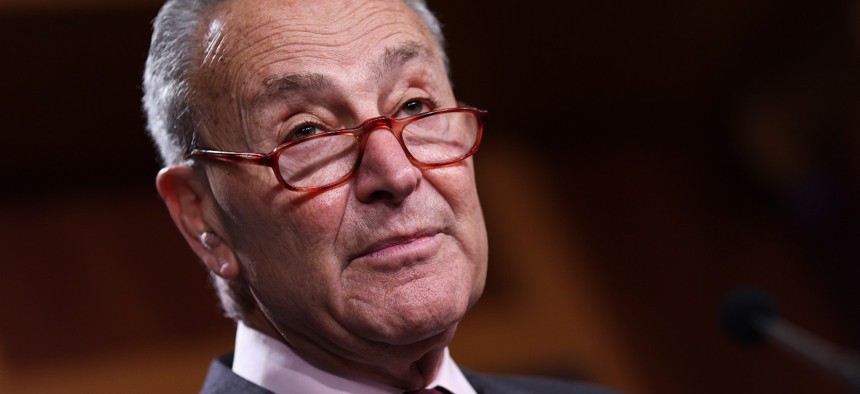
Senate Majority Leader Chuck Schumer, D-N.Y., said he would work with Republicans to “avoid even a hint of a shutdown.” Kevin Dietsch/Getty Images
Lawmakers Eye a Stopgap Spending Measure to Avoid a Shutdown Through Mid-December
Congress must iron out several wrinkles before passing the bill.
Congress is looking to fund federal agencies at their current spending levels through mid-December, with momentum growing for a 10-week stopgap bill to avoid a government shutdown on Oct. 1.
Lawmakers must clear several hurdles before voting on a continuing resolution to kick off fiscal 2023, but they could act as soon as this week. Senate Majority Leader Chuck Schumer, D-N.Y., said last week he would work with Republicans to “avoid even a hint of a shutdown,” though several disagreements remain. Negotiations appear to have settled on a CR that would fund agencies through approximately Dec. 16, but lawmakers have yet to determine exactly which provisions will be added to it.
Schumer has said his intention is to attach a measure to reform the permitting process necessary to approve major energy projects, which he previously agreed to consider as part of an agreement with Sen. Joe Manchin, D-W.Va., that allowed for the passage of the Democrats’ tax, health care and climate bill. Sen. Bernie Sanders, I-Vt., and dozens of House lawmakers have vowed to vote against a spending bill that has the permitting provisions, citing the potential for the reforms to allow for bypassing of environmental concerns.
The White House has asked Congress to include $47 billion in emergency funding with the CR, which would go toward Ukraine aid, COVID-19, and monkeypox response and disaster response. Republicans have expressed little interest in supporting more money for the public health crises, but suggested they could support more Ukraine aid.
“Obviously the one thing we need to do is to pass a continuing resolution to take us to some date that will, I guess, be determined by the majority past the election,” Senate Minority Leader Mitch McConnell, R-Ky., said last week. “The key to getting the CR done with the least amount of controversy is for it to be as clean as possible.”
He added that while “the cleaner the CR the better,” there was bipartisan support behind ensuring adequate resources for Ukraine.
House Majority Leader Steny Hoyer, D-Md., told Bloomberg on Monday that the Senate would likely act first in passing the stopgap spending bill. He included a potential vote on the measure on the House schedule for this week. The majority leader acknowledged the permitting reforms, if included, could cause complications in a House vote.
Hoyer also suggested the CR would include a reauthorization of user fees for the Food and Drug Administration. Absent congressional action, the agency's ability to collect the fees would expire at the end of the month and 3,500 employees could face layoffs or furloughs. The agency has held off sending official notices to employees, citing expectations that Congress will act, but it could do so in the coming weeks if lawmakers do not show progress.
Schumer expressed optimism that Congress will avoid a shutdown in October and would pass a full-year appropriations measure before the end of the year.
“We prefer to get an omnibus bill done before the end of the year,” Schumer said. “We think there are a good number of Republicans who agree with that and so we’re hoping the CR will go to about mid-December and then we might do an omnibus.”
Sens. Patrick Leahy, D-Vt., and Richard Shelby, R-Ala., the top lawmakers on the Senate Appropriations Committee, have yet to reach a breakthrough on such a funding package, but both are retiring at the end of the year and hope to strike a final deal before they do. They must still agree on the top-line funding levels for the defense and non-defense parts of the budget. A change in control in either chamber during the midterm elections in November could also change the calculus for those negotiations.







